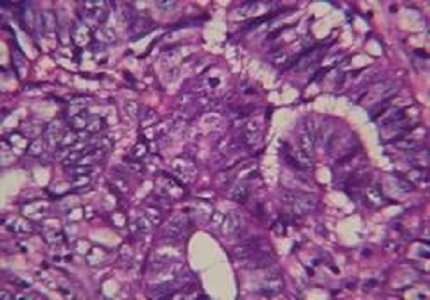A study of PTEN expression in endometrial hyperplasia and endometrioid type of endometrial carcinoma
Abstract
Background: To analyze the role of PTEN expression in hyperplastic and neoplastic endometrium by immunohistochemistry and to find the grades of PTEN expression in neoplastic, hyperplasic and normal endometrium.
Methods: 100 numbers of endometrial samples were studied retrospectively. The tissue were fixed in formalin and taken up for routine histopathological and immunohistochemistry studies.
Results: In our study PTEN is well expressed in a score of 2+ and 1+ in cyclical endometrium and hyperplasia without atypia whereas altered PTEN expression was noted in atypical hyperplasias and endometroid type of endometrial carcinoma in a score of 0and 1+.
Conclusion: The current study proved that PTEN expression is down regulated in endometrial pathological condition. Immunohistochemical evaluation of PTEN expression was useful in screening precancerous hyperplasia lesions and detecting earliest stage of endometrial carcinogenesis.
Downloads
References
2. Terakawa N, Kanamori Y, Yoshida S. Loss of PTEN expression followed by Akt phosphorylation is a poor prognostic factor for patients with endometrial cancer. Endocrine-related cancer. 2003 Jun 1;10(2):203-8.
b
3. Chow LM, Baker SJ. PTEN function in normal and neoplastic growth. Cancer letters. 2006 Sep 28;241(2):184-96. [PubMed]
4. Risinger JI, Hayes AK, Berchuck A, Barrett JC. PTEN/MMAC1 mutations in endometrial cancers. Cancer research. 1997 Nov 1;57(21):4736-8. [PubMed]
5. Kapucuoglu N, Aktepe F, Kaya H, Bircan S, Karahan N, Çiriş M. Immunohistochemical expression of PTEN in normal, hyperplastic and malignant endometrium and its correlation with hormone receptors, bcl-2, bax, and apoptotic index. Pathology-Research and Practice. 2007 Mar 28;203(3):153-62.
6. Li XC, Song WJ. Endometrial Intraepithelial Neoplasia (EIN) in endometrial biopsy specimens categorized by the 1994 World Health Organization classification for endometrial hyperplasia. Asian Pacific Journal of Cancer Prevention. 2013;14(10):5935-9.
7. Sun H, Enomoto T, Fujita M, Wada H, Yoshino K, Ozaki K, Nakamura T, Murata Y. Mutational analysis of the PTEN gene in endometrial carcinoma and hyperplasia. American journal of clinical pathology. 2001 Jan 1;115(1):32-8.
8. Maxwell GL, Risinger JI, Gumbs C, Shaw H, Bentley RC, Barrett JC, Berchuck A, Futreal PA. Mutation of the PTEN tumor suppressor gene in endometrial hyperplasias. Cancer research. 1998 Jun 15;58(12):2500-3.
9. Ørbo A, Nilsen MN, Arnes MS, Pettersen I, Larsen K. Loss of expression of MLH1, MSH2, MSH6, and PTEN related to endometrial cancer in 68 patients with endometrial hyperplasia. International journal of gynecological pathology. 2003 Apr 1;22(2):141-8.
10. Kanamori Y, Kigawa J, Itamochi H, Sultana H, Suzuki M, Ohwada M, Kamura T, Sugiyama T, Kikuchi Y, Kita T, Fujiwara K. PTEN expression is associated with prognosis for patients with advanced endometrial carcinoma undergoing postoperative chemotherapy. International journal of cancer. 2002 Aug 20;100(6):686-9.
11. Erkanli S, Kayaselcuk F, Kuscu E, Bagis T, Bolat F, Haberal A, Demirhan B. Expression of survivin, PTEN and p27 in normal, hyperplastic, and carcinomatous endometrium. International Journal of Gynecological Cancer. 2006 May 1;16(3):1412-8.
12. Moreno‐Bueno G, Rodríguez‐Perales S, Sánchez‐Estévez C, Marcos R, Hardisson D, Cigudosa JC, Palacios J. Molecular alterations associated with cyclin D1 overexpression in endometrial cancer. International journal of cancer. 2004 Jun 10;110(2):194-200.
13. Mutter GL, Lin MC, Fitzgerald JT, Kum JB, Baak JP, Lees JA, Weng LP, Eng C. Altered PTEN expression as a diagnostic marker for the earliest endometrial precancers. Journal of the National Cancer Institute. 2000 Jun 7;92(11):924-30.
14. Latta E, Chapman WB. PTEN mutations and evolving concepts in endometrial neoplasia. Current Opinion in Obstetrics and Gynecology. 2002 Feb 1;14(1):59-65. [PubMed]



 OAI - Open Archives Initiative
OAI - Open Archives Initiative


